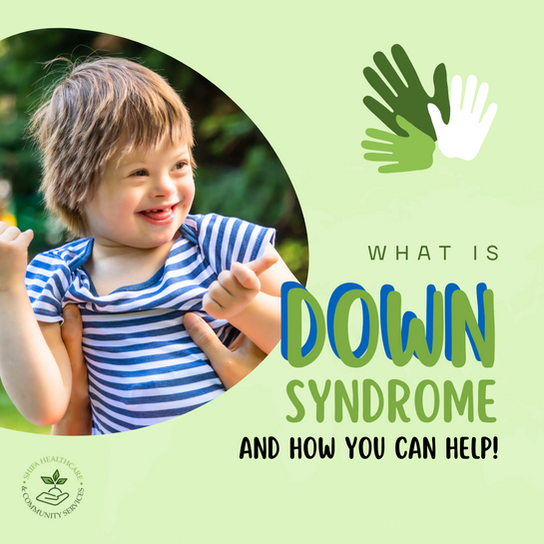WHAT IS DOWN SYNDROME?
Down syndrome occurs when a person has an extra chromosome. Chromosomes carry DNA, and DNA makes each person unique and individual. Humans should have 46 chromosomes. Down syndrome occurs when a baby is born with more than 46 chromosomes.
FACTS
About 6,000 babies with Down syndrome are born in the United States each year. This is equivalent to 1 in every 700 babies. Researchers have not determined what causes Down syndrome. One risk factor for having a baby born with Down syndrome is the mother’s age. Women 35 years and older are more likely to have a baby with Down syndrome. This risk factor increases as the mother’s age increases. Babies born with Down syndrome are at higher risk of having other health problems. About 50% of babies diagnosed with Down syndrome are also born with a congenital heart defect. Other health problems include hearing loss, obstructive sleep apnea, a higher rate of infections, and diseases related to the eyes. The life expectancy of people living with Down syndrome has increased dramatically over the years. Now, the average life expectancy is about 60 years old.
UNIQUE INDIVIDUALS
All people with Down syndrome have some level of cognitive impairment. This level is unique to all individuals. It can be a mild, moderate, or severe delay. The same is true for the physical development of individuals with Down syndrome. Everyone born with Down syndrome is also born with their own unique talents and gifts. People with Down syndrome can work, go to school, develop meaningful relationships, and contribute to society in many ways. Special education programs, a supportive home environment, quality health care, and an empowering support system can all help an individual with Down syndrome thrive in their world.
HOW TO SUPPORT
Get to know someone with Down syndrome before assuming what they can and cannot do. Remember that the physical and cognitive impairment of everyone varies. Do not assume that all people with Down syndrome need help all the time. Many individuals can experience some level of independence. During instances where the individual with Down syndrome needs a lot of support, the family members may fill this role. In some cases, caring for someone with Down syndrome can be a 24/7 role. Offering help to family members may be important. Providing respite care for the parents, completing some errands, or doing chores around the house can be ways to support the family. Simply asking the family members what they would like support with is enough. Volunteering is also a great way to support individuals and families with Down syndrome. There are many local and national organizations that provide respite care, education, training, and recreation for people with Down syndrome. Perform a quick online search and see how your unique talents and gifts can give back to the community.
References
Data and Statistics on Down Syndrome. Centers for Disease Control and Prevention.
Facts about Down Syndrome. Centers for Disease Control and Prevention.
Facts, Myths & Truths about Down Syndrome. National Down Syndrome Society.

